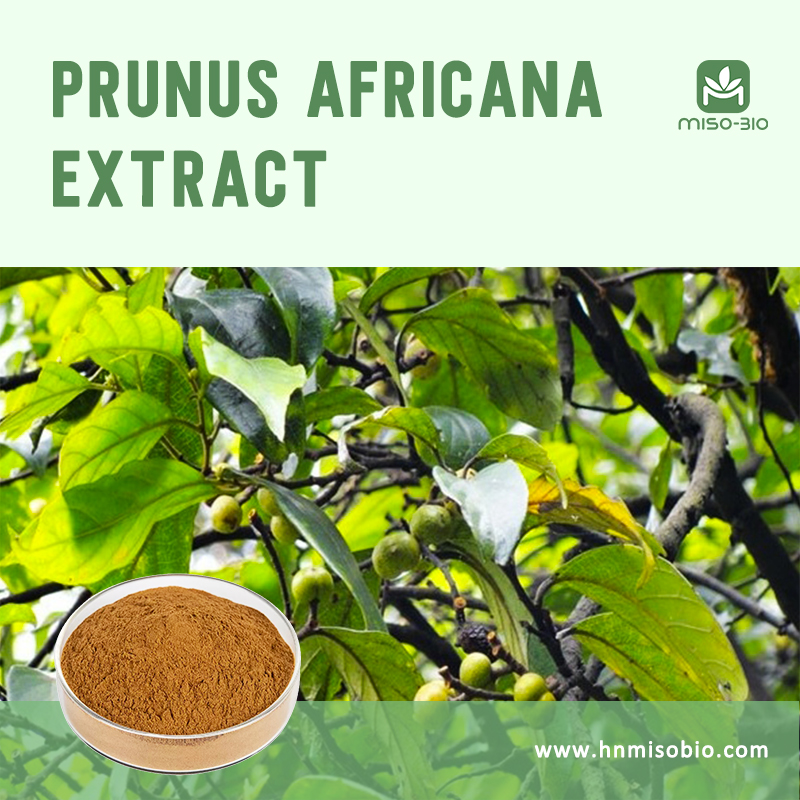Prunus Africana, also known as the African plum tree or pygeum, is an evergreen tree found predominantly in Africa. It can grow up to 40 meters in height and is recognized by its bark, which peels naturally revealing a reddish-brown wood underneath.
The bark of this tree has long been used in traditional medicine for its various health benefits. It is rich in bioactive compounds like phytosterols, tannins, ferulic acid, and triterpenes. This tree's bark extract, so called Prunus Africana Extract, is used most commonly for treating symptoms of Benign Prostatic Hyperplasia (BPH), but also holds antioxidant, antimicrobial, and anti-inflammatory properties, which contribute to its application in the general promotion of health and well-being.
Top 5 Medical benefits of Prunus Africana Extract
Top 1 It may help treat benign prostatic hyperplasia (BPH)
Benign Prostatic Hyperplasia (BPH), or enlarged prostate, is a common condition as men get older. An enlarged prostate can block the flow of urine through the urethra, leading to urinary problems.
Prunus Africana, or Pygeum, has been found to potentially help in reducing symptoms associated with BPH. Its effectiveness is related to its ability to reduce inflammation and regulate hormones.
In multiple studies, Pygeum has been shown to significantly improve urological symptoms and flow measures. One review of 18 randomized controlled trials involving over 1,500 men found that those taking Pygeum bark extract were twice as likely to report an improvement in symptoms than those taking a placebo, with few side effects (Coulson et al., 2013).
Another study involving 85 men with BPH found that 6 weeks of taking Pygeum led to a 40% reduction in nighttime urination and a 32% reduction in residual urine volume (Allkanjari et al., 2015).
Top 2 It may help treat prostate cancer
Prostate cancer is the second most common cancer in men globally. Various natural products, including the extract of Prunus africana, have been researched for their potential anti-cancer properties.
Prunus africana bark extract contains several bioactive compounds, including phytosterols, tannins, and ferulic acid, which have shown potential in combating prostate cancer cells in laboratory studies.
A study published in the Journal of Ethnopharmacology (Ochwang’i et al., 2014) involved in vitro (lab) testing of Prunus africana extract against human prostate cancer cells. The study found that the extract inhibited the proliferation of these cancer cells, suggesting that it may have anti-cancer potential.
Similarly, a study from the "Asian Journal of Andrology" (Papaioannou et al., 2010) suggested that when combined with another plant extract (Hedera helix), Prunus africana extract demonstrated a significant reduction in cancer cell viability, pointing towards its potential use in prostate cancer therapy. Papaioannou M, Schleich S, Prade I, et al. (2010).
 Top 3 It may help treat urocystitis
Top 3 It may help treat urocystitis
Urocystitis, an inflammation of the bladder, can cause painful and frustrating symptoms. Prunus africana (Pygeum) has not been extensively studied for treating urocystitis specifically, but it has been shown in some research to have general anti-inflammatory properties that could potentially alleviate inflammation in various conditions, including urocystitis.
One in vitro study indicated that Pygeum extracts could inhibit the production of certain prostaglandins, which are hormone-like substances that are involved in inflammation and pain (Schleich, S., et al., 2006). Thus, this evidence could be interpreted as suggesting a possible role for Pygeum in the management of inflammatory conditions like urocystitis.
Top 4 It may help reduce general inflammation
Pygeum’s benefits to the prostate and beyond may be attributed to some anti-inflammatory properties. A vitro study, published in Planta Medica (Schleich et al., 2006) provided further evidence of Pygeum's anti-inflammatory potential. It was found that the extract inhibited the production of certain prostaglandins (PGE2 and PGF2α). These compounds are hormone-like substances involved in inflammation and pain, suggesting that controlling their production could alleviate inflammatory conditions.
Top 5 It may help boost libido
Some early evidence suggests that Pygeum, or Prunus africana, may potentially boost libido or sexual desire. This might be attributed to its traditional use in African medicine for managing urinary disorders and enhancing sexual performance.
How to use Prunus Africana Extract? Any risk there?
Prunus Africana, also known as Pygeum, is often consumed as a dietary supplement, typically in capsule or tincture form. The dosage generally recommended is based on the level of active constituents in the product, and it may vary as per individual's age, weight, overall health condition, and the purpose for which it is being used. So it is crucial to use in line of label.
Pygeum is generally considered safe for most people when taken by mouth in amounts commonly found in medicine for up to a year, it can cause some side effects like upset stomach and headache. There have also been some reports of liver and kidney damage in people taking Pygeum, but these cases are rare.
The bottom line
Originating from African herbal medicine, Pygeum holds several traditional uses and shows potential in alleviating symptoms associated with BPH (enlarged prostate), kidney disease, and other urinary disorders. Should you consider incorporating pygeum into your regimen? Discussing with your doctor always make senses. They can help establish whether pygeum aligns with your health goals and guide you on the next steps accordingly.